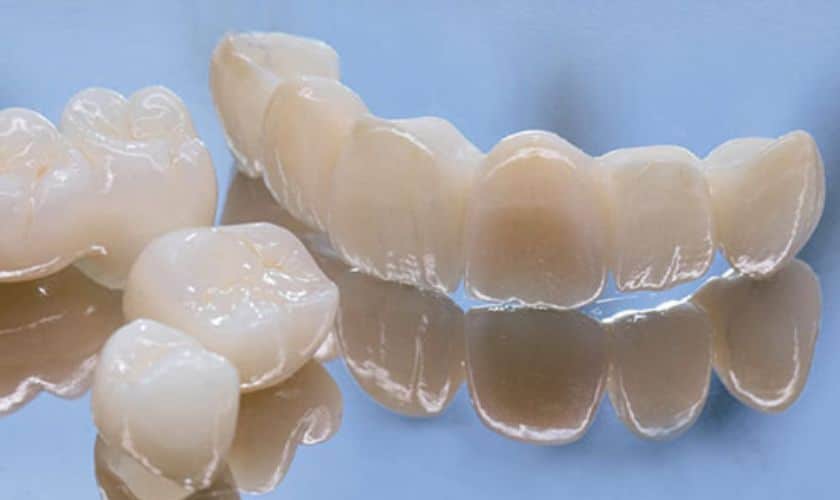Have you ever heard of porcelain crowns? They are a type of dental restoration that can give your teeth a complete makeover. If you have missing or damaged teeth, porcelain crowns may be the solution for you! Not only do they look natural and beautiful, but they also provide functionality and durability. In this blog post, we will explore everything you need to know about porcelain crowns – from what they are, their benefits, and how they differ from metal ones. Get ready to discover the art of dental restoration with porcelain crowns!
What is a Porcelain Crown?
A porcelain crown is a dental restoration that covers the entire tooth. It acts as a protective layer while improving the appearance and function of your teeth. The process involves removing any damaged or decayed parts of the original tooth, then placing a custom-made crown over it.
Porcelain crowns are made from a high-quality ceramic material that mimics the look and feel of natural teeth. This makes them an excellent choice for anyone looking to restore their smile without compromising on aesthetics.
Unlike metal crowns, which can be easily noticeable due to their metallic shine, porcelain crowns blend in seamlessly with your other teeth, giving you a more natural-looking smile. They also provide better durability and resistance against stains compared to other materials like resin or composite fillings.
If you have chipped, cracked or discolored teeth that affect your confidence when smiling or speaking in public, talk to your dentist about getting porcelain crowns as they may be the ideal solution for restoring both form and function!
What is the Difference Between a Porcelain Crown and a Metal One?
When it comes to restoring a damaged or decayed tooth, dental crowns are often one of the most recommended solutions. While both porcelain and metal crowns can provide excellent results, they have some notable differences.
Firstly, the materials used in each type of crown are different. Metal crowns are typically made from gold alloys or other metals such as nickel or chromium. In contrast, porcelain crowns are crafted entirely from a ceramic material that closely resembles natural teeth.
Another significant difference between these two types of crowns is their appearance. Metal crowns tend to be more noticeable due to their metallic color which contrasts with surrounding teeth. Porcelain crowns blend seamlessly with natural teeth due to their ability to mimic the look and translucency of natural enamel.
While metal crowns may be more durable than porcelain ones, they can cause wear on opposing teeth over time due to their hardness. On the other hand, porcelain is not as strong as metal but offers better protection for natural teeth thanks to its softness.
Ultimately, choosing a crown depends on individual needs and preferences. A consultation with your dentist will help you make an informed decision based on factors like durability requirements and cosmetic concerns.
Benefits of Porcelain Crown
Porcelain crowns are a popular dental restoration option that offers several benefits. Some of the Benefits are listed below:
- Natural Appearance: Porcelain crowns are designed to closely mimic the look and color of natural teeth, providing a seamless and natural-looking result.
- Durability: Porcelain crowns are highly durable and can withstand the daily wear and tear of biting and chewing, offering long-lasting restoration.
- Stain Resistance: Porcelain has a smooth surface that resists stains, helping to maintain the appearance of the crown and keeping it looking vibrant.
- Biocompatibility: Porcelain is biocompatible, meaning it is well-tolerated by the body and unlikely to cause adverse reactions or sensitivities.
- Customizable: Porcelain crowns can be custom-made to match the size, shape, and color of your natural teeth, ensuring a precise and personalized fit.
- Preservation of Tooth Structure: Porcelain crowns require minimal removal of the natural tooth structure, preserving as much of the healthy tooth as possible.
- Improved Functionality: By restoring the shape and size of damaged or decayed teeth, porcelain crowns can help improve biting, chewing, and overall dental function.
- Easy Maintenance: Porcelain crowns can be cared for like natural teeth, with regular brushing, flossing, and dental check-ups, making maintenance convenient and straightforward.
- Boosted Confidence: Porcelain crowns can enhance the appearance of your smile, leading to improved self-esteem and confidence in social and professional settings.
- Versatility: Porcelain crowns can be used to address a variety of dental issues, including tooth decay, cracks, chips, discoloration, and misshapen teeth, offering versatile solutions for smile restoration.
Opting for porcelain crowns provides numerous benefits including aesthetic appeal, durability, low maintenance requirements and improved functionality; making them an ideal choice for those seeking restorative dental solutions.
Conclusion
Porcelain crowns are an excellent option for restoring the function and aesthetics of damaged or decayed teeth. They offer several benefits over metal crowns, including a more natural appearance and improved biocompatibility. With proper care and maintenance, porcelain crowns can last for many years and provide patients with a durable and comfortable solution to tooth restoration.
If you’re considering getting a dental crown, be sure to discuss your options with your dentist to determine if a porcelain crown is right for you. By working with your dental provider, you can achieve the beautiful smile you deserve!

